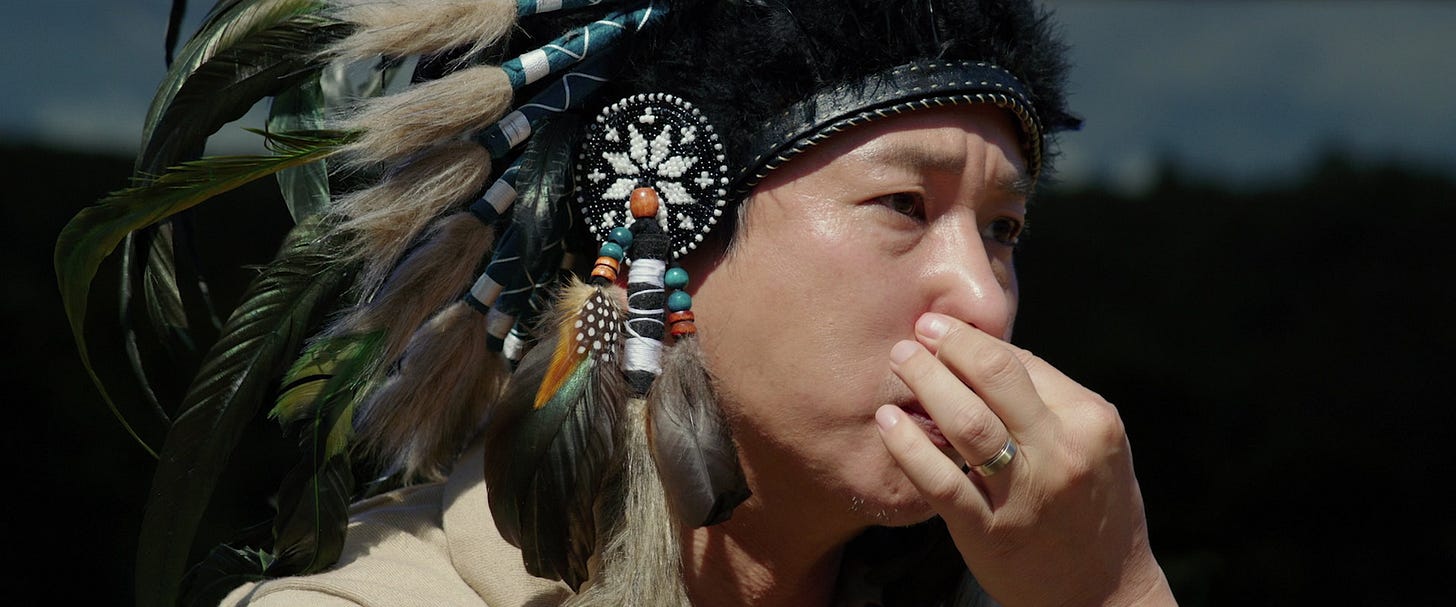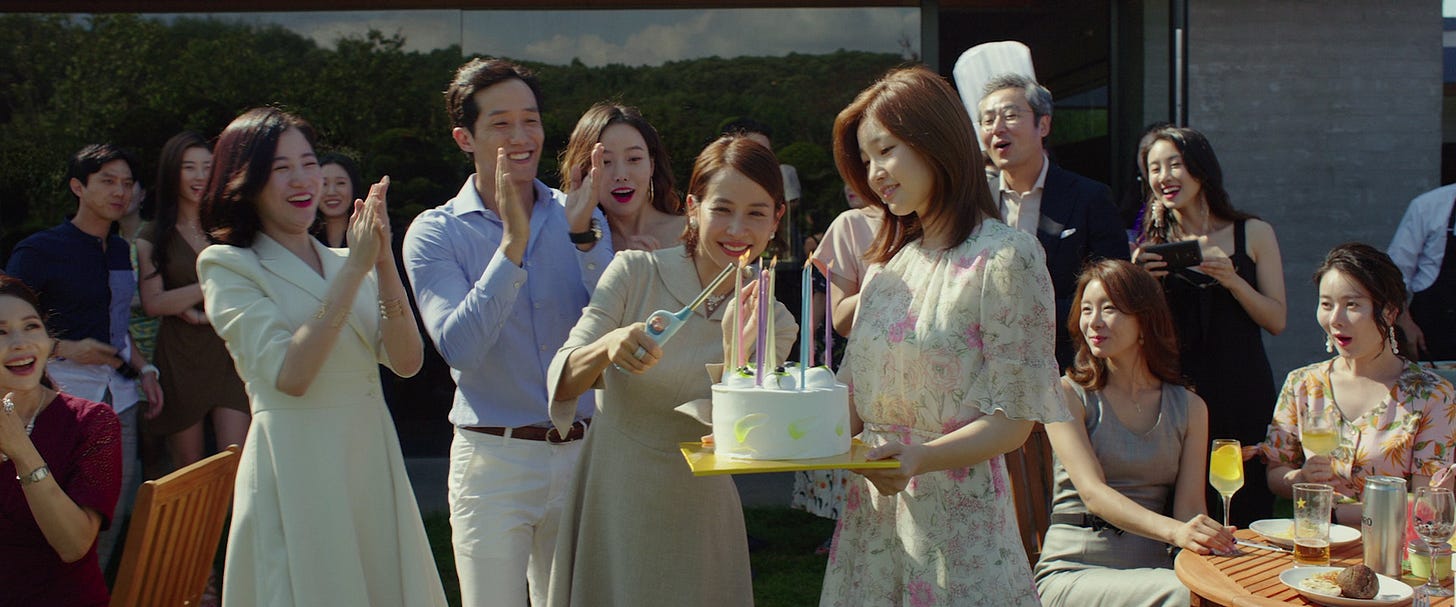Critically Analysing Parasite (2019), Five Years Later..
A Review of Bong Joon Ho's Oscar Winning Korean Film, Parasite (2019)
I recently watched Parasite (2019) and safe to say, I was absolutely blown away. I heard many praises of it when it initially came out and it even won multiple Oscars the year it released, being the first foreign film to achieve such a title. I went into it completely blind, did not see any trailers or even read the synopsis. I initially even thought it was a patent zero movie before watching, judging from the title. I absolutely adored the film and I mainly wanted to rant about what made the film so special to me. This will contain spoilers to Parasite, so you have been warned.
To recap, the story follows the Kim family, a very poor household, living in Korea’s slums. They try to get by with odd jobs until the son of the family, Ki-Woo, is recommended by his college friend, Min, to tutor the daughter of the wealthy Park family. Their family then proceeds to stealthily replace each of the workers in the household for each of them to become employed. The first half is mostly set as a dark comedy with the ways the Kim’s deceive the naive Park’s mother, Yeon-gyo. However, once the film reaches the halfway point, the genre shifts to one of thriller once it is revealed that someone is hiding underneath the Park’s home behind a secret mechanism in a shelf. Parasite has one of the most engaging latter halves of cinema I’ve seen and I was on the edge of my seat throughout the entire movie.
Cinematography
There is something special about the type of shots that Bong Joon Ho produces. This is my first film from him and I was amazed by some of these scenes he employs. I had to pause the movie a few times to simply take in the scenery.
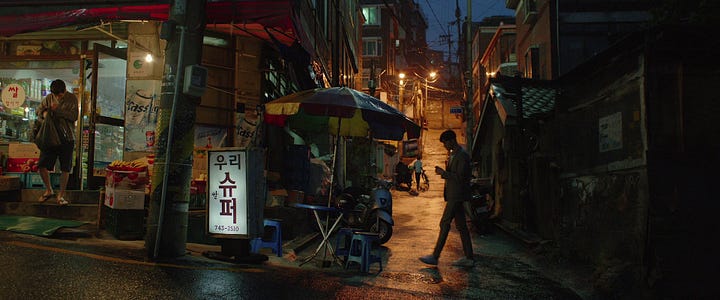
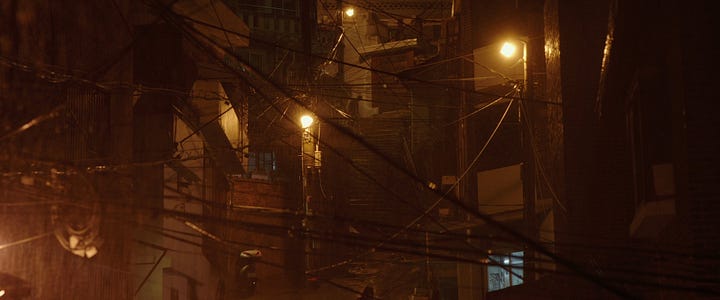
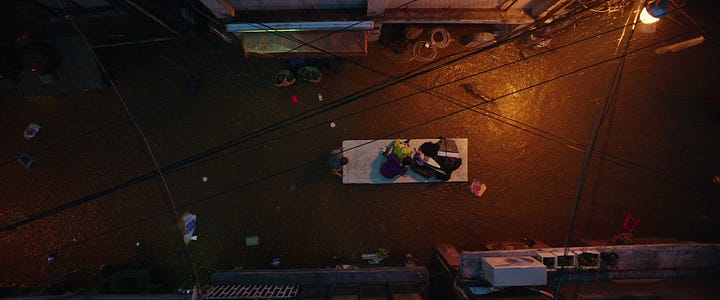
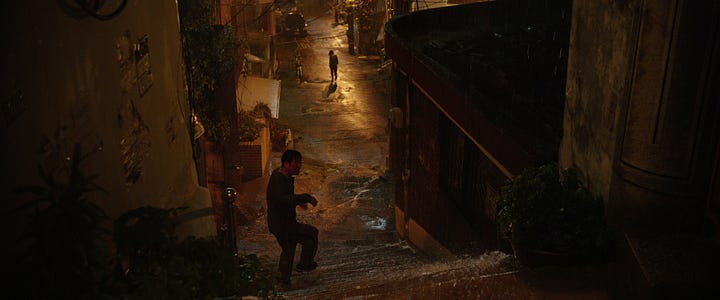
There would be several extended long shots which are not only to impress viewers but to place the viewers in the characters’ shoes. Most notable being the first descent into the bunker where this long cut emphasises the major tension of the scene combined with the screaming. It makes the staircase appear never ending and only makes the viewers wait in anticipation to see what lies downstairs.
The movie is simply shot masterfully in every sense of the word.
Themes
It’s no secret what the overarching themes of the film are, mainly the class difference between the rich and the poor. One of the main points is discussing who are the real “parasites”. Obviously at first, the Kim’s family are present as them, “leeching” off of the Park’s for employment. However, depending on your perspective, the opposite can be said, the rich taking advantage of the poor for their labour. Park Dong said that without the housekeeper, “the house would be a mess within a week”, because of Yeon-gyo inability to do housework.
What’s interesting as well is Bong Joon Ho use of elevation as representation of class structure. For example, the Park’s home is situated up a hill while the Kim’s are quite literally underground. When Ki-woo arrives at the home for the first time for tutoring, emphasis is given when he is seen ascending the stairs, going up the class structure. Inversely, during the flood sequence, they are descending back down “into poverty”. Another scene of note is when Chong-sook kicks down Moon-gwang down the basement stairs, showing how the poor will go after each other to cling onto whatever success they have.
Throughout the movie, the “line” or “crossing the line” is constantly brought up by Park Dong. Upon rewatches, you can identify numerous scenes where the two classes are separated on screen by a vertical line. It was coined by Mr. Park and it generally refers to the boundaries between the workers and employers and how they should not interfere or disrupt with their personal lives. Ironically, it is during the last set piece when the Park’s infringes on the Kim’s when they ask them to perform for their son’s birthday when they aren’t employed to do so. It can also be said that they invited them to “show off” their wealth to the guests, further strengthening the ‘rich are parasites’ notion.
Stench is also a theme that is brought up. The Park’s complains about the odor around the Kim’s and even Da-Song noted that they ‘smell the same’, referring to Ki-Taek and Chung-Sook. Initially, the reason was thought to be everyone in the family use the same shampoo but it is actually the basement smell. It displays that it is extremely difficult for them to escape poverty even though they’ve all of them have a paying job at this point.
Most complaints I read about the film was the ending climax, where Ki-Taek stabs Mr. Park. Some say it’s silly or out of nowhere for him to lash out like that from seemingly a simple gesture of clogging his nose. To rewind the timeline a bit, Ki-Taek had an highly stressful situation just the night before. He had learnt of the existence of the basement and had to fight their way out to escape, followed by their basement home being flooded out and having to stay in a shelter for the night. Not to mention, the salt in the wound when Yeon-gyo said the rain ‘was a blessing’, ignorant of the fact that hundreds of people displaced by it. Lastly, Mr. Park’s first instinct was to prioritize his son despite not needing immediate medical attention compared to Ki-Jung who was stabbed in the chest. The nose clogging was simply the straw that broke the camel’s back after a mountainous amount of pressure building up.
On the ending, it is quite a tragic one. Ki-Jung is dead, Ki-Taek is perpetually stuck in the basement, risking his life every time he goes out for food, Ki-Woo while free is for the most part, is mental handicapped due to his head trauma. The only silver lining is that they managed to recover the house after the flood. Ki-Woo dreams of a day where he earns enough money to buy the house and set his father free, however, a dream is all it ever will be because as mentioned before, it is extremely difficult for the poor to climb up the class structure, especially one that earns enough income to purchase a house like the Park’s. Even the actor for Ki-Woo, Choi Woo-Shik estimated that it would take him around 564 years to earn enough money. Not to mention, his mental handicap and criminal record. In the entire family, Ki Jung was regarded as the only one who had the skillset to fit in with the rich and escape. She makes her self at home in the Park’s baths and the couch and is the only one to be surrounded by the crowd during the birthday party.
Personal Feelings
I love Parasite to death, even after a few weeks of watching it for the first time. It is a masterclass of a film in almost every aspect. The music is gorgeous, the highlight being predictably, this scene in particular:
I was engaged for the whole ride and it is quite rare for media to do that to me. The acting is top notch; everyone played their roles perfectly and line delivery was perfection. Being Asian also makes me proud of an Asian film being so well received globally that I have some pride despite not being Korean.
It’s difficult to find anything to complain about or nitpick about Parasite. It really is that film that everyone needs to see and I’m guessing since you made it all the way here that you must’ve seen Parasite, I implore you to rewatch it. You’ll catch so much hidden meanings and foreshadowing that I didn’t even cover here. It is definitely one of the best films of recent history and a highlight of modern cinema.
Please free to give any feedback to my writing and recommend any films you think I would like. Tell me your thoughts about Parasite! I hoped you enjoyed reading this blog as much as I had fun writing it.






